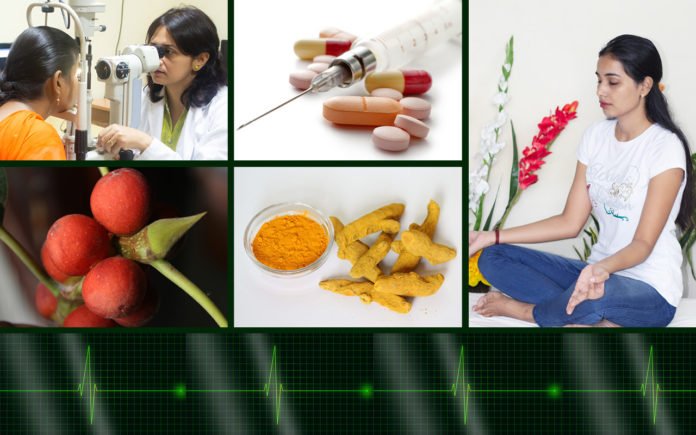The new age of scientific development is marked by enormous achievements of Modern System of Medicine. The Modern System Medicine has gained the status of mainstream medicine and replaced Traditional Systems of Medicine (TSMs) to a large extent in almost every part of the world. This system of medicine is based on hard scientific evidence and primarily advocates reductionist approach to health and disease.
Modern System of Medicine has, in its armamentarium, the unparalleled range of diagnostic tests, highly advanced surgical procedures, and an ever increasing array of molecules effective on pathological sites and organisms. It has successfully reduced the prevalence of infectious diseases and significantly improved the quality of life of patients with chronic ailments. No traditional system of medicine at present can provide an alternative to Modern Medicine for its life saving methods and devices. One cannot think of an all-inclusive health facility running without the help of Modern Medicine.
Despite all its glorious achievements, and the position it has acquired among all other health systems of the world, the Modern Medicine has its own limitations. It fails to put due emphasis on preventive, promotive and rehabilitative strategies, and is unable to provide lasting solution for most of the chronic ailments. It seems that Modern Medicine is unable to provide comprehensive health care to the patients and is making them dependent on medicines in order to ensure their assisted survival. People today, are increasingly realizing the limitations of Modern Medicine and are turning towards Traditional Medicine for their health needs. The volume of studies published on Alternative Medicine (AM), Traditional Medicine (TM) and Complementary and Alternative Medicine (CAM) is growing day by day and so is the market related to these systems.
The efforts to develop a well-organized system of integrative medicine started at different
times in different countries during last few decades. China is doing it in the most organized way. The process of integration in the US is still in its infancy. The establishment of National Centre for Complementary and Integrative Health (NCCIH) in 1998 and Academic Consortium for Integrative Medicine & Health (The Consortium) in 1999 indicate that efforts of integration are being intensified in the United States. The US is working on its own model by pushing the process of integration through narrow lanes of reductionist approach in order to retain ‘scientific evidence- based’ character of its model.
The ideal model of integration is the one that is feasible to implement and takes the nature and sociocultural acceptability of TM into consideration, hence, may differ from country to country. Indian model of Integrative Medicine should be based on integration of two main systems of medicine practiced in India i.e. Ayurveda and Modern Medicine. Ayurveda was the mainstream medicine of pre-colonial Indian subcontinent. It has a history of thousands of years and is evolved through centuries from the practice of primitive remedies mentioned in Atharvaveda into a well- organized and effective system of medicine of Caraka and Sushruta samhitas. Many contributions of Ayurveda, such as cataract surgery, rhinoplasty, blepharoplasty, to the development of different medical systems of the world are well recognized. Ayurveda is fundamentally a medical system of integrative nature.
It has progressed by imbibing the ideas from many other disciplines like Samkhya,
Vaisheshika, Nyaya, Yoga etc. In later period, Rasa Shastra, an independent science, contributed to and became an integral part of Ayurveda. Until the introduction of Modern Medicine to India, Ayurveda was open to any knowledge that could help it become a better health system. But due to various reasons the communication between Ayurveda and Modern Medicine could not be established. Both of the systems continued to serve Indian population separately without any significant cross talk with each other. Gradually, Modern system of medicine became more popular primarily due to its rapid effects on disease conditions, and had replaced the age-old indigenous medical system of India to a large extent.
The efforts of integration began in India in 19th century. Banaras Hindu University (BHU) started working on its model of integration of Ayurveda and Modern Medicine in early period of 20th century. BHU model proposes educating a pupil in both Ayurveda and Modern system of medicine so that s/he can diagnose and treat the patient using the methods of either or both of the systems of medicine simultaneously as per his/ her best judgment, and according to the nature of disease. The guiding principle here essentially remains the holistic and not the reductionist approach. BHU model of integration, though followed in many parts of India, has not found adequate support from the state and political establishment. This lack of support has kept the process of integration rather slow and unorganized.
Nowadays, as the popularity, acceptability and market of TM, CAM and IM is increasing very fast, the well-organized efforts for promotion of Integrative medicine could no longer be ignored. This is the right time that government of India should come forward for its strategic support and make provisions in the legal framework in order to facilitate the integration of Ayurveda and Modern medicine.
India should work on its own model of integration. The US model is not suitable for India due to two major reasons. First, here we primarily need to integrate Modern Medicine with the most prevalent indigenous holistic medicine, Ayurveda and not the alternative therapies like acupressure and acupuncture that are not indigenous to India. Second, here the integration of both streams of medicine should evolve naturally and Ayurvedic treatment and research should not always be subjected to the reductionist methodology of Biomedicine. India should continue with BHU model of integration. BHU model suggests to produce health care professionals who are trained to practice either or both of the Ayurveda and Modern Medicine as per the need of patients. Over a period of time Ayurveda and Modern Medicine would naturally grow into a unified and truly Integrative System of Medicine.


